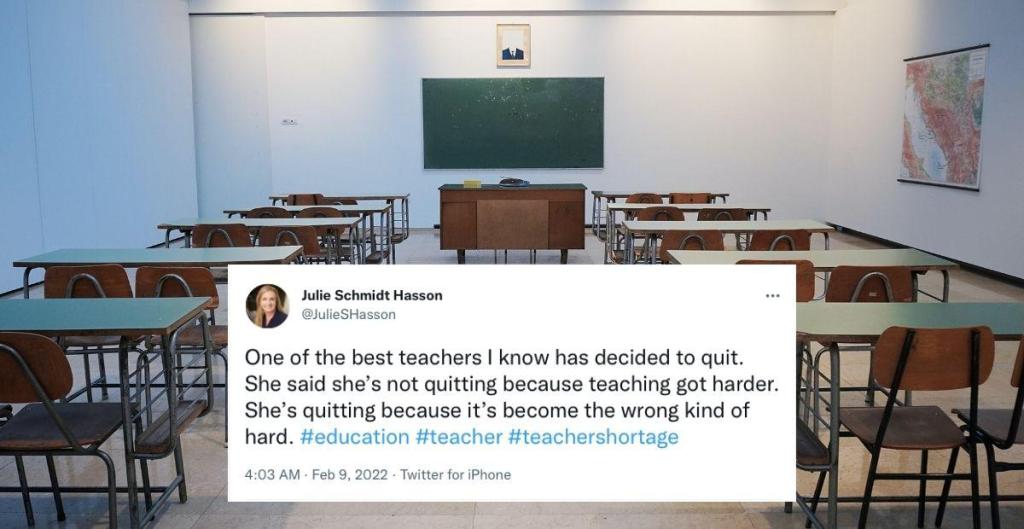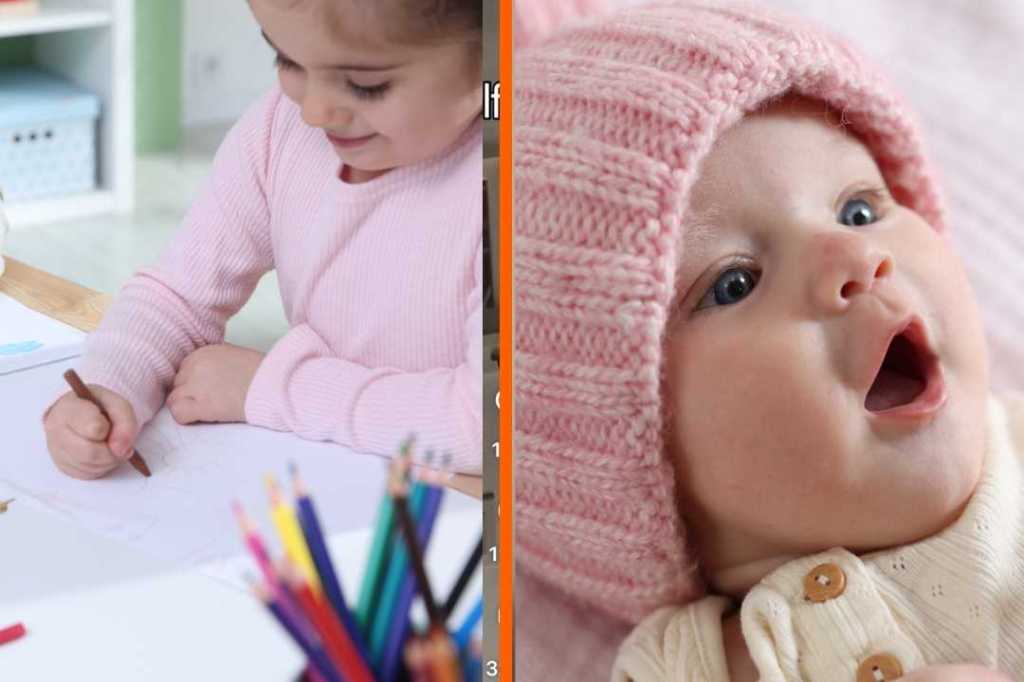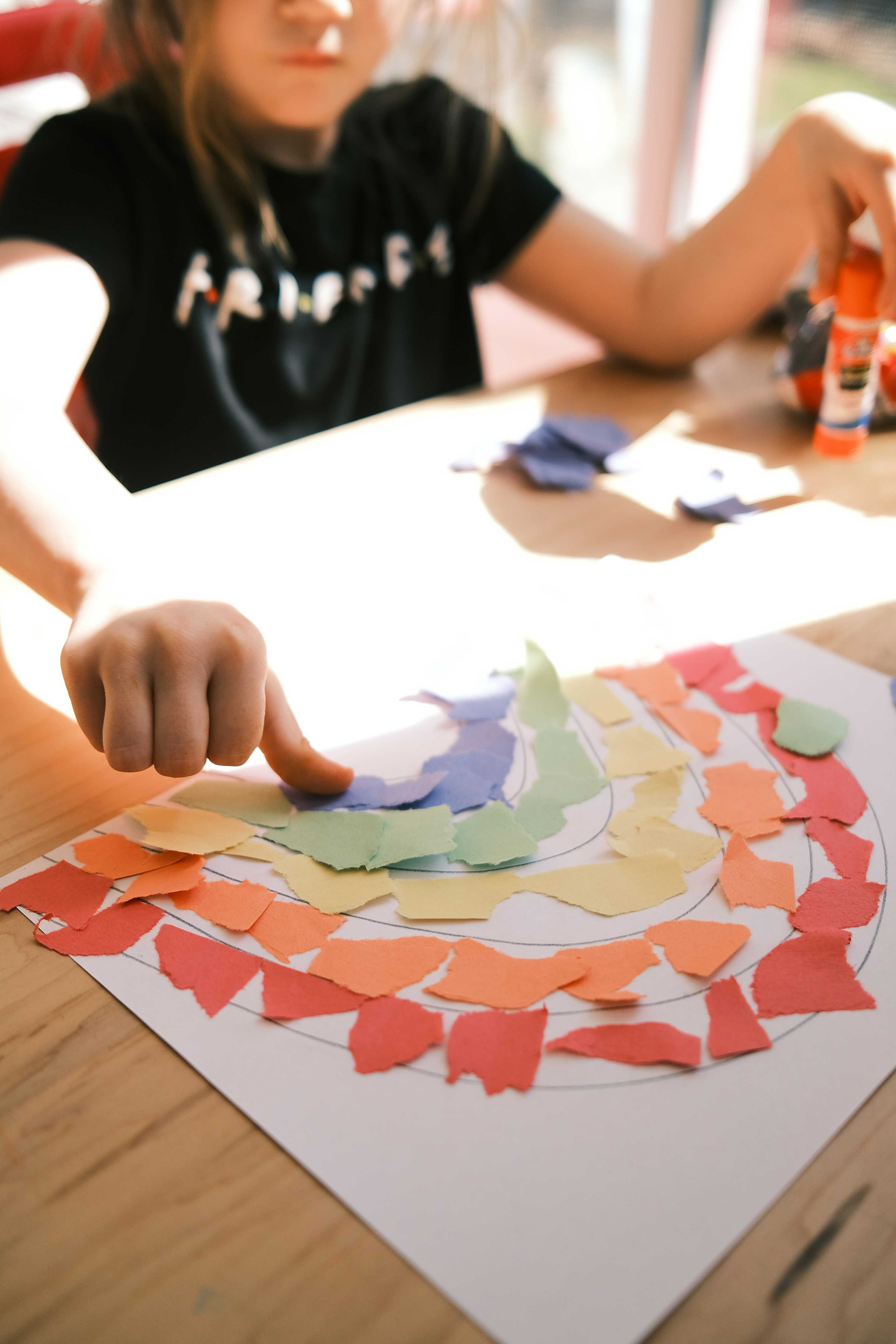When I was a child, I used to line up my dolls and stuffed animals on my bedroom floor, pull out my mini-chalkboard and in my best teacher’s voice, “teach” them reading, writing and arithmetic. Pretending to be a teacher was my favorite kind of imaginative play. In college, I majored in Secondary Education and English and became an actual teacher. I loved teaching, but when I started having kids of my own, I quit to stay home with them. When they got to school age, I decided to homeschool and never went back to a traditional classroom.
I kept my foot in the proverbial school door, however. Over the years, I’ve followed the education world closely, listened to teacher friends talk about their varied experiences and written countless articles advocating for better pay and support for teachers. I’ve seen a teacher burnout crisis brewing for a while. Then the pandemic hit, and it was like a hurricane hitting a house of cards. Teachers are not OK, folks. Many weren’t OK before the pandemic, but they’re really not OK now.
A recent poll from the National Education Association found that 90% of its members say that feeling burned out is a serious problem, 86% have seen more teachers quitting or retiring early since the pandemic began and 80% say that job openings that remain unfilled have added to the workload of those who are still teaching. And more than half of teachers say they will leave the profession earlier than they had planned.
I checked in with several dozen teachers who have quit recently or are close to quitting, and the response was overwhelming. Over and over I heard the same sentiments: I went into teaching because I enjoy working with kids and I want to make a difference. I love teaching. I love my students. These are teachers who throw their whole heart into their work.
So why are they quitting? The reasons are plentiful—and heartbreaking.
Low pay is an issue many of us think of when it comes to teachers, but it’s not the main thing pushing teachers to quit. One teacher told me that in his school district, garbage collectors make $10K more per year and have better benefits than teachers with graduate degrees and a decade of experience, but that wasn’t his primary reason for wanting to leave. There’s no question teachers deserve to be paid more—a lot more—but teachers don’t choose to become teachers for the money, and most don’t quit because of the money, either. It’s the issues that make the wages not worth it.
One of those issues is a lack of recognition that teachers are actually highly skilled professionals. “Paying teachers like we are professionals would go a long way,” says Bonny D., an educator in Idaho, “but really it’s about trusting us to be able to do our work. Many teachers have Master’s degrees or have been teaching for many years, but still aren’t listened to or considered experts when it comes to helping students succeed.”
Jessica C. has taught middle and high school English in three different states and resigned in December. She says she loved working with kids and designing curriculum, but she finally left after seeing more and more teacher autonomy get stripped away as standardized testing became the primary focus.
“Despite my years of experience across multiple states and my two graduate degrees in education, I felt like nobody with any real power believed I was actually competent at my job,” she says. “I saw evidence that my students were growing as readers and writers, but at the end of the day the only thing that mattered was hitting a certain number on those state assessments. It was really disheartening to feel like nothing else mattered but that test, and that even though the test itself doesn’t resemble any real-world reading or writing skills in any way, it was supposed to be the focus of all of my instruction.
“But let’s not forget,” she added, “I also wasn’t allowed to look at it at all or even really know what was on it or how it would be scored.”
California elementary school teacher Ann B. shared a similar sentiment: “Teaching over the past decade has lost its charm and sparkle. So many mandates, broken systems, top-down management from people who haven’t spent much time in the classroom made it difficult.“
Sarah K. teaches high school history and AP psychology in Tennessee. Unlike most of the teachers I spoke to, she is having one of the best school years of her career, but she shares concern for the state of public education in general. “I think a lot of teachers feel attacked and are afraid and are feeling like the job can’t be done anymore,” she told me. “As a society, we have lost our ability to trust each other, and it is manifesting itself in not trusting teachers to teach, do their jobs and follow our hearts to love and inspire kids.”
In addition to micromanagement from administrators, classroom control from legislators and demonization from parents, I had two teachers share with me that they’d been through a school shooting. ESL teachers from different states shared that their school districts refused to put resources toward programs that would help their students succeed and basically told them that those students didn’t matter. Other teachers feel like their own lives don’t even matter.
“A teacher passed away from COVID in January in a different building,” says Jenn M., a 14-year veteran teacher from Pennsylvania. “The kids had the day off. The teachers came in and had no directive of what to do. We got tested for COVID, and that was it. I literally feel like if I die, nobody in the district would care about me. I want to feel important and impactful at work.”
And then there’s the mental load that has always existed for teachers but has definitely been exacerbated by the pandemic. Teaching is not 8:00 a.m. to 3:30 p.m. with the summers and holiday breaks off. That’s just not how it works; not for any teacher I’ve ever known. And it’s taxing work on every level. You’re working with dozens if not hundreds of kids every day. You care about them and their well-being, you’re trying to teach them whatever your subject is but also helping nurture them into fully functional human beings. You have constantly changing expectations coming from every side.
“Teaching is all-encompassing,” says an elementary school teacher from New Mexico who wishes to remain anonymous. “It is seriously draining emotionally and physically. It’s not just a job that is easily turned off at the end of the day when you go home.
“Everything falls on the teachers,” she adds. “We are stuck in a no-win situation in the middle of a societal crisis. Schools have been pushing higher academics at earlier ages and the need to teach basic social skills, norms and niceties is higher than ever. Our roles and the demands on us are just increasing.”
Bonny D. agrees. “There is a mental load that goes with teaching,” she says. “It’s very difficult to specifically identify. It’s the workload, it’s the constant changing of what’s required of us as legislation changes, it’s the restrictions on what we can teach, the expectation that we will work outside of the paid contract hours, the fact that it’s easier to go to work sick than make sub plans, it’s micromanaging teenagers, doing extra things in the school with no extra pay, the low morale created by parents who want to dictate what we do in the classroom without ever discussing it with us or volunteering in the classroom themselves.”
And so much of what’s expected of teachers is self-contradictory, as Jessica C. points out in a bullet list summary of what teachers have been asked to do over the past few years:– Differentiate your instruction for every child, but don’t deviate from what the textbook says to teach.
– Teach directly from the textbook, word for word and page for page whenever possible, but also spend hours of your time designing a unit plan (even though one is provided in the textbook company’s supplementary materials).
– Turn in detailed weekly lesson plans, even though we really just want you to turn the page and read what it says every day.
– Hold every child to high expectations and keep all your instruction and assessment on grade level, but make sure none of them fail, even if they come into your room drastically below grade level.
– Attend regular PLC meetings, but the principal is going to set the agenda and run the whole meeting and you won’t really be asked to contribute anything at all. (Again, we’re going to ignore that year-long training you got in your last district about the PLC model and just assume you don’t know that we’re deviating from the model completely.)
– You should be focusing on instruction, not wasting a minute of class time, but we’re also going to expect you to collect T-shirt order forms, and fundraiser money, and take your kids down to the cafeteria for school pictures, and fill in for colleagues on your planning period. Oh, and you’ll have to stay late several times a grading period so that you can work the gates at athletic events, because your professional performance review will be based on how much you gave to the school above and beyond your job description and contractual obligations.
The pandemic, of course, has made everything worse. Teachers have borne the brunt of all the upheaval in education, not only in having to completely change the way they teach and implement new technologies overnight, but also in dealing with the emotional and developmental challenges their students are facing throughout all of this. The pandemic has also exacerbated and highlighted issues of inequity in education that were already there.
Catlin G. is an intervention specialist who has taught for 18 years, primarily in schools in under-resourced communities. She says that what many districts are now dealing with—attendance and staffing issues, high variability in children’s academic growth, a lack of resources—are all too familiar to her and the students she has worked with.
“The pandemic drew a lot of attention to the role of education, but much of it has been focused on issues such as CRT or masking, which have deflected from bigger, long-term problems in schools, such as low literacy rates and crumbling infrastructure. I hope that people don’t simply forget about education issues once their kids no longer have to wear masks to school, and begin to think about how we can make education better for all kids.”
Some teachers cite student behavioral issues as contributing to their burnout, but most of the teachers I heard from held on in the classroom as long as they felt they could for their students’ sake. After all, teachers generally go into teaching because they love kids and want to work with them.
“I never wanted to leave,” an elementary school teacher from Washington who quit this year told me. “I cried with my students during my last week in the classroom. Their outpouring of love and understanding melted my heart. I had never felt so conflicted in a decision because I loved the students and my job.”
Between the pandemic throwing classroom teaching into chaos, parents and legislators dictating how and what teachers teach, and increasing assessments and top-down administration creating micromanagement issues, teachers feel like they aren’t able to do the jobs they love and signed up for. They’re not quitting because they hate teaching—they’re quitting because they can’t teach under these conditions. It’s tragic, truly, and it’s up to all of us to throw our support behind educators to stem the crisis a mass exodus of teachers will lead to.
This article originally appeared three years ago.

































